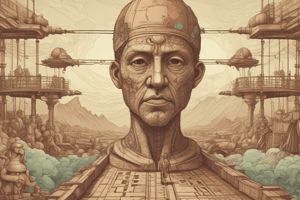Podcast
Questions and Answers
What are developmental transitions?
What are developmental transitions?
- Periods of change and growth that mark the passage from one developmental stage to another (correct)
- Periods of conflict and regression in development
- Periods of adjustment and adaptation between different species
- Periods of time when development stops temporarily
What are cohort and longitudinal studies used for in developmental psychology?
What are cohort and longitudinal studies used for in developmental psychology?
- To analyze the influence of sports on motor skill development
- To track changes in a group of individuals or follow the same individuals over an extended period to study development over time (correct)
- To study the impact of social media on adolescent behavior
- To study the effects of music on child development
What is the primary focus of developmental psychologists?
What is the primary focus of developmental psychologists?
- To study the development of animals in their natural habitats
- To understand the physical, cognitive, and social development of individuals throughout the life span (correct)
- To investigate the effect of climate change on human behavior
- To analyze the impact of technology on human development
Flashcards are hidden until you start studying
Study Notes
Introduction
Psychology is the scientific study of behavior and mental processes, including perception, attention, memory, beliefs, emotions, motivation, problem-solving, language, and interpersonal relationships. One of its branches, developmental psychology, is a specialized area of research that focuses on the psychological and social changes that occur in human beings from the prenatal period to old age. This article will delve into the subfield of developmental psychology, exploring its history, key concepts, and the role of developmentalists in understanding human development.
History of Developmental Psychology
Developmental psychology emerged as a distinct field of study in the early 1900s, with the publication of Charles Spearman's book, "The Development of the Child" (1902). The field has since evolved and expanded, responding to new scientific discoveries and changing social contexts. Some notable milestones in the history of developmental psychology include:
- 1930s: The publication of the first book on child development, "Child Development" (1928), by Arnold Gesell and Frances Ilg.
- 1950s: The development of psychological theories about child development, such as Piaget's theory of cognitive development.
- 1960s: The emergence of the concept of "ontogeny" (the development of an individual from birth to death) as a central concept in developmental psychology.
- 1970s: The recognition of the importance of social and cultural factors in child development.
- 1980s-1990s: The growth of the field of developmental psychology into a large, complex, and diverse domain of scientific inquiry.
Key Concepts in Developmental Psychology
Developmental psychology is concerned with understanding the physical, cognitive, and social development of individuals throughout the life span. To achieve this, it employs several key concepts:
- Critical Periods: Certain stages of development are considered "critical periods" because they are crucial for the development of specific skills or behaviors.
- Transitions: Developmental transitions are periods of adjustment and adaptation that mark the passage from one developmental stage to another.
- Developmental Theories: These are frameworks that help explain the processes and mechanisms of development. Some famous developmental theories include Piaget's theory of cognitive development, Erikson's theory of psychosocial development, and Kohlberg's theory of moral development.
- Cohort and Longitudinal Studies: These research methods allow developmentalists to study development over time, by tracking changes in a group of individuals (cohort study) or by following the same individuals over an extended period (longitudinal study).
Role of Developmentalists
Developmental psychologists study the ways in which infants and children develop across different domains, such as cognitive, social, emotional, and motor skills. They may also research the factors that influence development, such as genetics, environment, and culture. Some of the duties and responsibilities of developmentalists include:
- Conducting research and analyzing data to understand the developmental processes.
- Collaborating with other professionals, such as educators and healthcare providers, to apply their knowledge in real-world settings.
- Communicating their findings to the public, helping to raise awareness and inform policies related to child development.
Conclusion
Developmental psychology is a fascinating subfield of psychology that focuses on the psychological and social changes that occur in human beings throughout their lives. By examining key concepts, the history of the field, and the roles of developmentalists, we gain a deeper appreciation for the complexities of human development and the importance of understanding these processes for the betterment of society.
Studying That Suits You
Use AI to generate personalized quizzes and flashcards to suit your learning preferences.




